 Backend Development
Backend Development
 PHP Tutorial
PHP Tutorial
 How to configure the PHP development environment in VSCode (detailed version)
How to configure the PHP development environment in VSCode (detailed version)
How to configure the PHP development environment in VSCode (detailed version)
How to configure the PHP development environment in VSCode (detailed version)? Friends who don’t understand, come and learn! I believe you will gain something after reading this article

1. Download XAMPP
XAMPP is an easy to install Apache distribution, which includes MariaDB, PHP and Perl. Just download and launch the installer.
XAMPP download address
Official website download: https://www.apachefriends.org/zh_cn/download.html
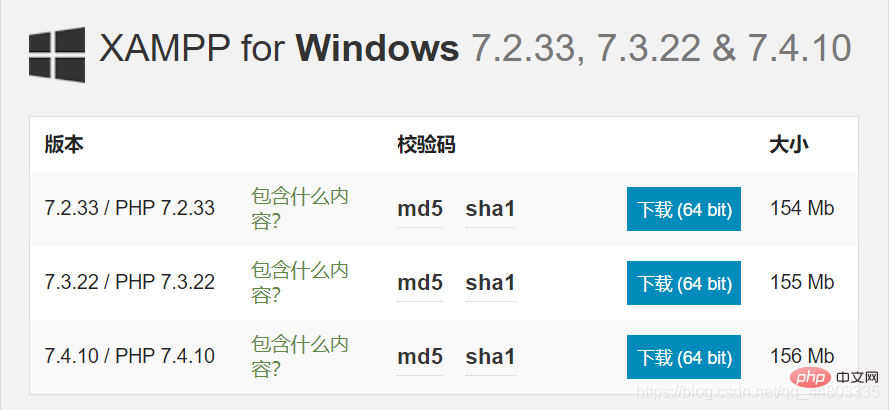
Other address for downloading: http://xiazai.zol.com.cn/detail/38/372445.shtml
(It is recommended to download this, choose local download-Telecom channel or China Unicom channel is acceptable)
After downloading, the PHP version number is as follows. You will need to use it later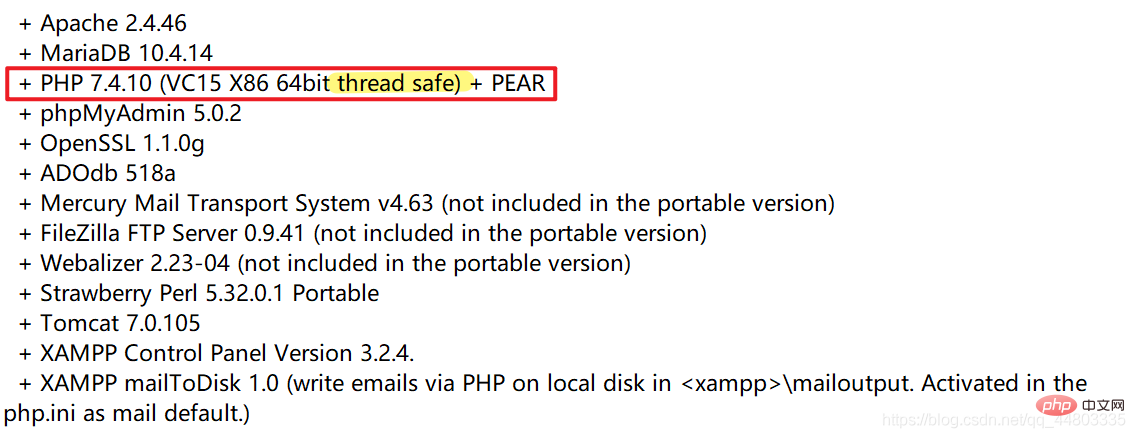 to install XAMPP
to install XAMPP
All the way NEXT, it is best not to choose the C drive as the installation address. The author installed the English version.
Installation successful
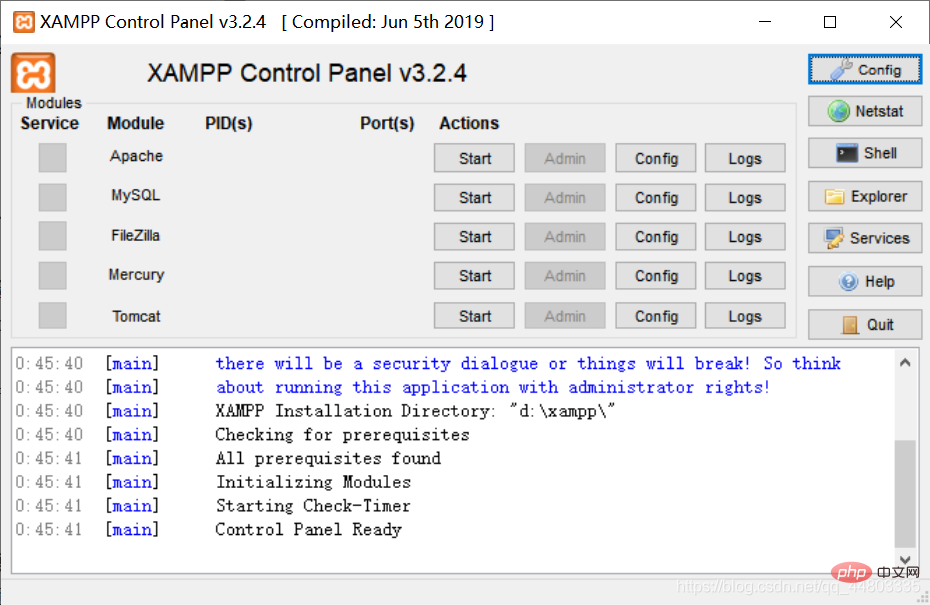
Enable according to requirements. If I write PHP, I choose to enable Apache.
Add system variables
Add the path to the folder where PHP.exe is located (the author's is "D:\XAMPP\php") to the environment variable- System variables-Path (you can find it by searching for system variables in the search box directly).
Enter php -v in cmd to check whether the configuration is successful
Configuration is successful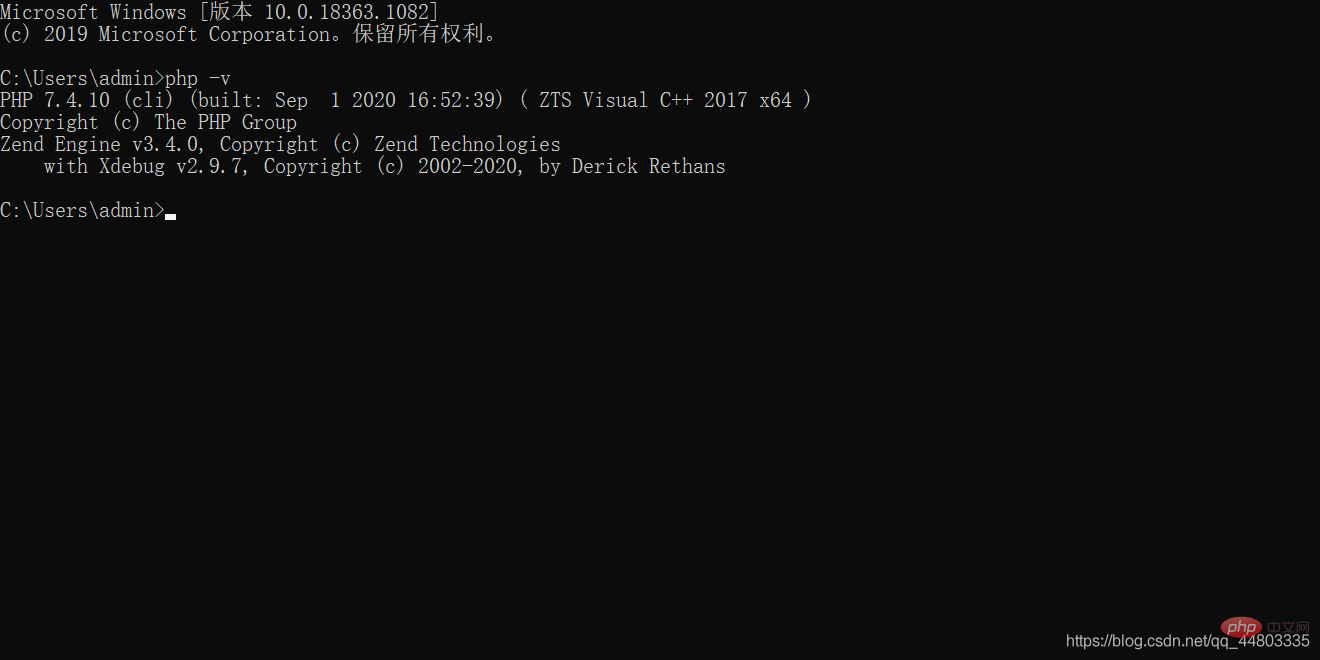
2. Download the xdebug plug-in
Download address: https://xdebug.org/download
Which PHP version to download can be seen in the README in XAMPP
(The author's is PHP 7.4.0, and it is Thread safe version, corresponding to the version with TS, download the corresponding version without nts, file name: php_xdebug-2.9.7-7.4-vc15-x86_64.dll) 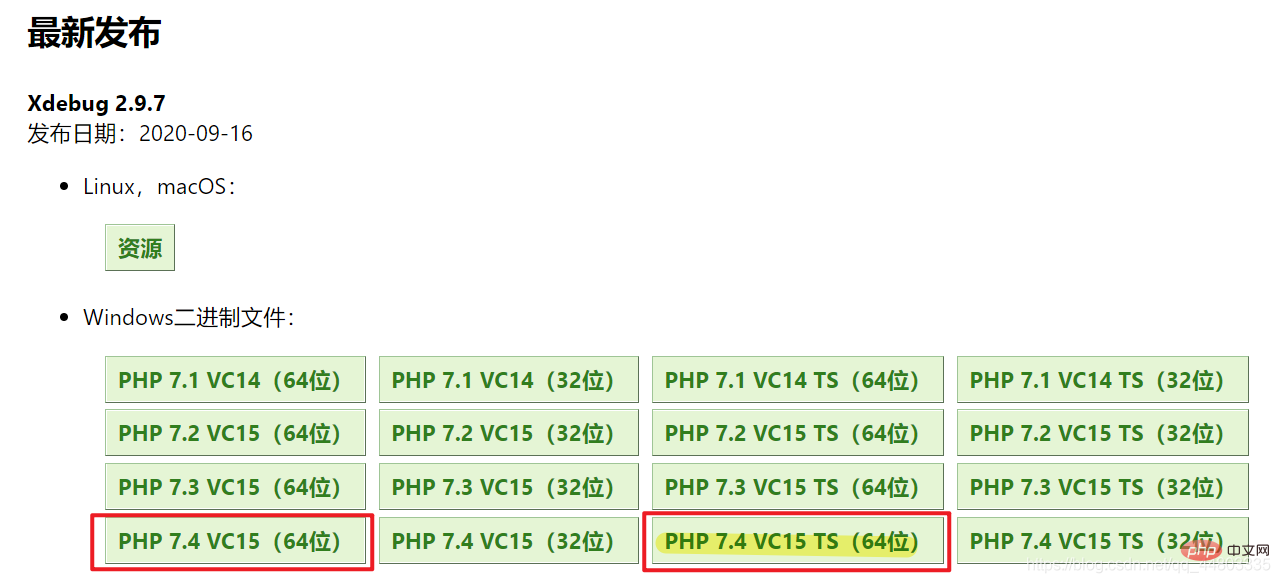
Add configuration
Copy the downloaded x-debug file (php_xdebug-2.9.7-7.4-vc15-x86_64.dll) to the php\ext folder
Use Notepad to modify the php.ini file , add a few lines of configuration information at the end of the file, and save it.
[xdebug]zend_extension="D:/xampp/php/ext/php_xdebug-2.9.7-7.4-vc15-x86_64"//这个地址以及文件名一定要正确xdebug.remote_enable = 1xdebug.remote_autostart = 1
3. Download and install VSCode
Download address: https://code.visualstudio.com/
In VSCode Install the debugging plug-in
1. Click the extension bar, enter PHP, and select PHP Debug to install.
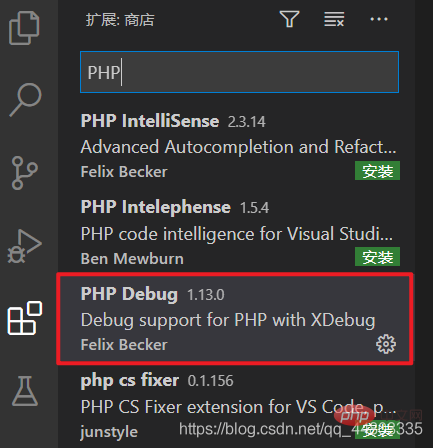
2. Click VSCode’s File-Preferences-Settings (different versions may display differently, pay attention to search for user settings), find php in the extension in the settings, click setting.json and add the following One-line configuration:
"php.validate.executablePath": "D:/xampp/php/php.exe",//地址是php.exe文件所在的位置
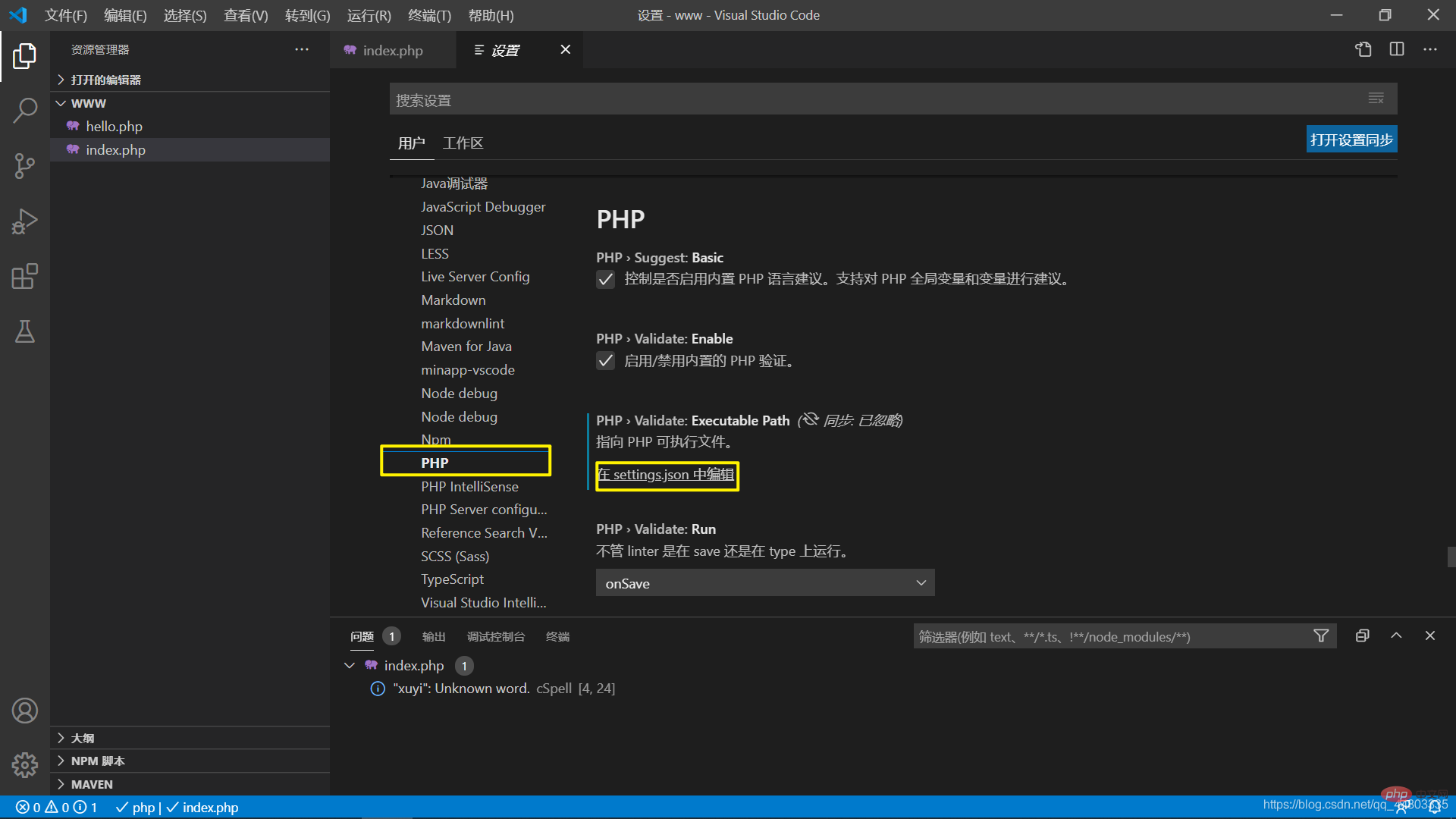
3. Configure the launch.json that Debug
will pop up by default, no need to change.
4. Then simply debug and verify whether the configuration is successful.
Note that you must open a folder to successfully set breakpoint debugging. A single file is invalid. You can choose D:/xampp/php/www
<?php $a = 'hello world';echo $a;?>
to set a breakpoint and then start debugging.
5. Open the php to be debugged in the browser (not the file path but the address of the server (http://localhost:3000/hello.php)), VSCode will hit the Breakpoint location.
6. Finally, it is recommended to install this plug-in: PHP Server
You can choose to right-click PHP Server: Serve project and jump directly to the browser

7 , Running results
Recommended learning: "PHP Video Tutorial"
The above is the detailed content of How to configure the PHP development environment in VSCode (detailed version). For more information, please follow other related articles on the PHP Chinese website!

Hot AI Tools

Undresser.AI Undress
AI-powered app for creating realistic nude photos

AI Clothes Remover
Online AI tool for removing clothes from photos.

Undress AI Tool
Undress images for free

Clothoff.io
AI clothes remover

AI Hentai Generator
Generate AI Hentai for free.

Hot Article

Hot Tools

Notepad++7.3.1
Easy-to-use and free code editor

SublimeText3 Chinese version
Chinese version, very easy to use

Zend Studio 13.0.1
Powerful PHP integrated development environment

Dreamweaver CS6
Visual web development tools

SublimeText3 Mac version
God-level code editing software (SublimeText3)

Hot Topics
 1378
1378
 52
52
 Alipay PHP SDK transfer error: How to solve the problem of 'Cannot declare class SignData'?
Apr 01, 2025 am 07:21 AM
Alipay PHP SDK transfer error: How to solve the problem of 'Cannot declare class SignData'?
Apr 01, 2025 am 07:21 AM
Alipay PHP...
 Explain JSON Web Tokens (JWT) and their use case in PHP APIs.
Apr 05, 2025 am 12:04 AM
Explain JSON Web Tokens (JWT) and their use case in PHP APIs.
Apr 05, 2025 am 12:04 AM
JWT is an open standard based on JSON, used to securely transmit information between parties, mainly for identity authentication and information exchange. 1. JWT consists of three parts: Header, Payload and Signature. 2. The working principle of JWT includes three steps: generating JWT, verifying JWT and parsing Payload. 3. When using JWT for authentication in PHP, JWT can be generated and verified, and user role and permission information can be included in advanced usage. 4. Common errors include signature verification failure, token expiration, and payload oversized. Debugging skills include using debugging tools and logging. 5. Performance optimization and best practices include using appropriate signature algorithms, setting validity periods reasonably,
 Explain the concept of late static binding in PHP.
Mar 21, 2025 pm 01:33 PM
Explain the concept of late static binding in PHP.
Mar 21, 2025 pm 01:33 PM
Article discusses late static binding (LSB) in PHP, introduced in PHP 5.3, allowing runtime resolution of static method calls for more flexible inheritance.Main issue: LSB vs. traditional polymorphism; LSB's practical applications and potential perfo
 Framework Security Features: Protecting against vulnerabilities.
Mar 28, 2025 pm 05:11 PM
Framework Security Features: Protecting against vulnerabilities.
Mar 28, 2025 pm 05:11 PM
Article discusses essential security features in frameworks to protect against vulnerabilities, including input validation, authentication, and regular updates.
 How to send a POST request containing JSON data using PHP's cURL library?
Apr 01, 2025 pm 03:12 PM
How to send a POST request containing JSON data using PHP's cURL library?
Apr 01, 2025 pm 03:12 PM
Sending JSON data using PHP's cURL library In PHP development, it is often necessary to interact with external APIs. One of the common ways is to use cURL library to send POST�...
 Customizing/Extending Frameworks: How to add custom functionality.
Mar 28, 2025 pm 05:12 PM
Customizing/Extending Frameworks: How to add custom functionality.
Mar 28, 2025 pm 05:12 PM
The article discusses adding custom functionality to frameworks, focusing on understanding architecture, identifying extension points, and best practices for integration and debugging.
 Describe the SOLID principles and how they apply to PHP development.
Apr 03, 2025 am 12:04 AM
Describe the SOLID principles and how they apply to PHP development.
Apr 03, 2025 am 12:04 AM
The application of SOLID principle in PHP development includes: 1. Single responsibility principle (SRP): Each class is responsible for only one function. 2. Open and close principle (OCP): Changes are achieved through extension rather than modification. 3. Lisch's Substitution Principle (LSP): Subclasses can replace base classes without affecting program accuracy. 4. Interface isolation principle (ISP): Use fine-grained interfaces to avoid dependencies and unused methods. 5. Dependency inversion principle (DIP): High and low-level modules rely on abstraction and are implemented through dependency injection.
 How does session hijacking work and how can you mitigate it in PHP?
Apr 06, 2025 am 12:02 AM
How does session hijacking work and how can you mitigate it in PHP?
Apr 06, 2025 am 12:02 AM
Session hijacking can be achieved through the following steps: 1. Obtain the session ID, 2. Use the session ID, 3. Keep the session active. The methods to prevent session hijacking in PHP include: 1. Use the session_regenerate_id() function to regenerate the session ID, 2. Store session data through the database, 3. Ensure that all session data is transmitted through HTTPS.



